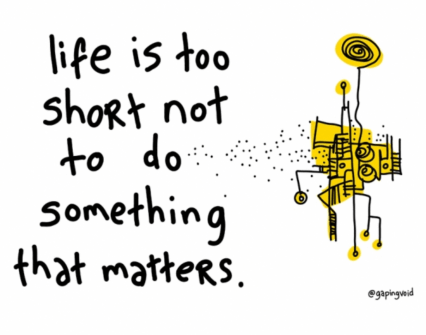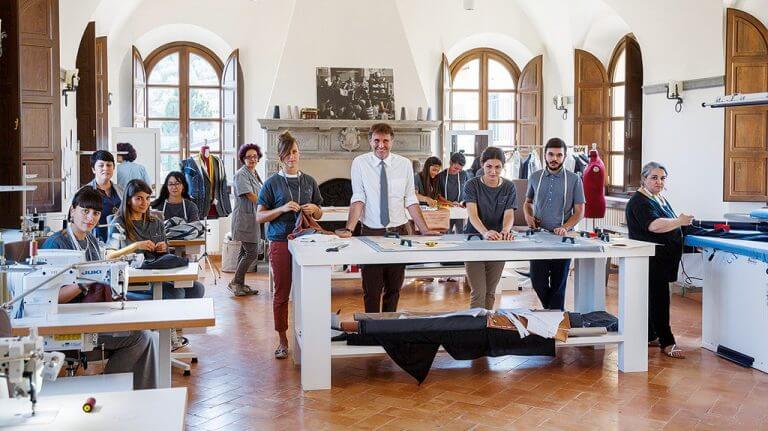
This image was embedded in the award given to each member of a seminal Leadership Growth Programme. More in this article. Business can be Beautiful.
Today I share an excerpt from a post from Alan Moore of beautiful.business, featured recently in “Is yours, could yours be a Beautiful Business?“. In Alan’s post I share today he asks a question and gives wonderful examples to show that businesses can indeed be both beautiful and profitable.
To begin, I am a “both, and” person rather than an “either, or” one, so I love his question.
Businesses that are focussed on both purpose and profit can have a greater impact on the world. Purpose AND Profit, not Purpose AND Profit
In my career working with leaders and organisations around the world, I have felt, seen and witnessed the evidence again and again.
As Simon Sinek says, “people don’t buy what you do, they buy why you do it”, and when that why is a purpose that your team aligns around, your role as a leader is made so much easier as they are intrinsically motivated around that shared purpose. As a result, profits can flow from such smooth alignment, creating a virtuous circle of “both, and”.
I love how Alan has elevated to the concept of beautiful business, so today share an excerpt from his article (posted in full on his site here), case studies of business and beauty, beautiful business in fact.
CAN BUSINESSES BE BEAUTIFUL AND PROFITABLE?
The lens of beauty enables more thoughtful design. It inspires the crafting of more meaningful products and services. It creates a resilient business, with a more committed workforce. Beautiful leadership brings out the very best in people so they feel inspired to do their best work. Beauty is not a soft option, it takes hard work and commitment. But as I illustrate in my CEO guide, it can produce real returns for those who are willing to invest.
The business case for purpose

Brunello Cucinelli has been making clothes very successfully since 1978. Cucinelli pays his staff more than the average wage for their jobs, insists they work no longer than eight-and-a-half hours a day, and spends around 20% of his profits on what he calls “the gift”.
He also runs an oversubscribed craft school, where students learn tailoring, stonemasonry and embroidery, among other disciplines. His listed company grows at 10% every year. Cucinelli has developed a business philosophy that draws on Renaissance humanism, Senecan stoicism, Benedictine rigor, and the theories of Theodore Levitt, a 20th Century marketing scholar who argued that the purpose of companies is to keep and serve customers. Cucinelli says “I would like to make a profit using ethics, dignity, and morals. I don’t know if I’ll be able to, but I’m trying. Of course, I believe in a form of capitalism. I would just like it to be slightly more human.”
The business case for collaborative leadership

We all know the company Pixar — they make animated movies. Pixar are an extremely successful company making great films, not only because they are masterpieces in animation but because they tell compelling stories.
But this is not easy. After the runaway success of Toy Story, Ed Catmull and his team agreed there had to be a way of openly and tenderly holding a creative idea so that it could evolve to its true potential of excellence every time. To do this it required the idea to be open to close scrutiny in every aspect of its script, design and production. It was for this reason that the Braintrust was created.
In a large room, members of Pixar regularly come together to openly test the development of a film. The rules are: only constructive criticism, and to speak with candour. It requires great trust to do this, to speak plainly and honestly and for the director to listen to all feedback. Without trust there can be no creative collaboration.
The focus is on solving a problem. Individual knowledge becomes a collective intelligence, highly valuable in examining how one gets from mediocre to world class. Catmull believes every movie they start with sucks in the beginning. In his words, meetings are filled with ‘frank talk, spirited debate, laughter and love’; they are there to excavate the truth in a movie.
The other rule is that the director is never instructed to do something. The director listens and develops his or her own interpretation and understanding of feedback given.
It is unusual for a creative company, or any company, to work so rigorously in an open, collaborative environment. It takes patience and time – something Pixar are willing to give. To create enduring beauty requires intense collaboration between people who share the purpose of creating something truly unique. Anyone, therefore, no matter in which industry they work, can create their own Braintrust. It might just get you from mediocre to great. Don’t move fast and break things, move slow and build them – so that they are meaningful, valuable and useful.
Muhammad Ali’s best poem

Muhammad Ali was once asked what his shortest poem was. He replied in two words: ‘Me, We’. In these two short words Ali gave insight into our true human nature. We need to be truly ourselves as individuals, but we can only be so when connected to a greater ‘We’. The Me needs the We to create more than is possible as an individual; and the We needs Me – every Me – to come with their full capacity to create meaning collectively. ‘We’ is how we create narrative, culture, context and meaning – it’s the glue that binds us. Strip a business of the means to create We, and we all suffer as a result.
Collaborative cultures have released the creative potential at Pixar. They are the root of how humanity gets things done at scale. For whatever reason this seems to be misunderstood – St Exupéry once said, “If you want to build a ship, don’t give out orders and tell people exactly what to do, teach them to yearn for the vast and endless sea”
It is the soft skills of a leader, of listening openly, making time, helping, being honest, and creating moments of opportunity where the individual and collective heart, hand, and mind can begin to build the new. And it just may be they are better at it collectively than you. Allowing people to arrive at their own conclusions of what needs to be done, and embracing what they create, is another form of wise leadership.
These examples of leadership inspire me. All these leaders care deeply about people, and the world we live in. It simply cannot be that you believe you can lead anyone, if you don’t. These leaders are not effete, but serious men and women who believe that beautiful things are made with love, and, infused with optimism, say that life is, and can be worthwhile.
They believe business is the answer, they also believe businesses should be profitable in the truest sense of the word.
Businesses should be profitable in the truest sense of the word.
Amen Alan, amen.
